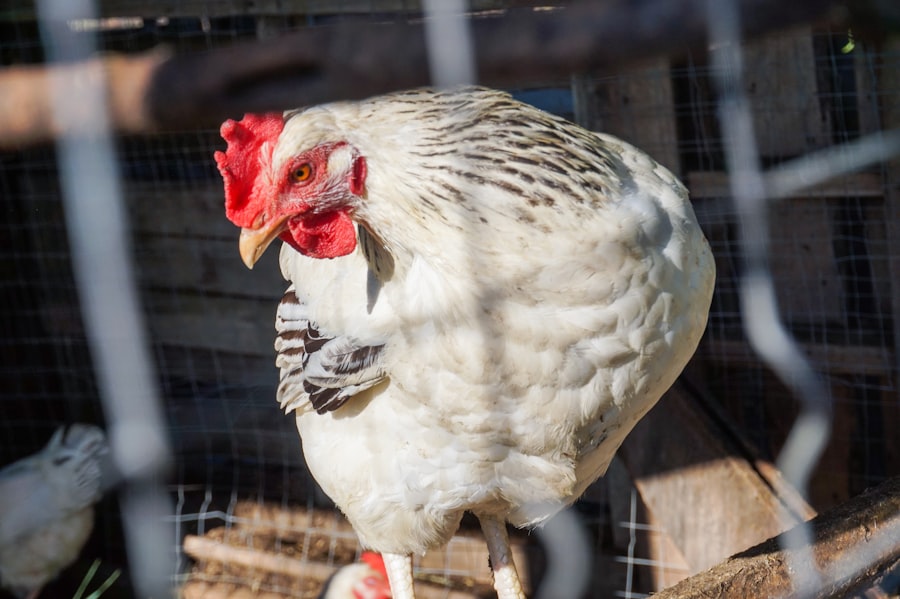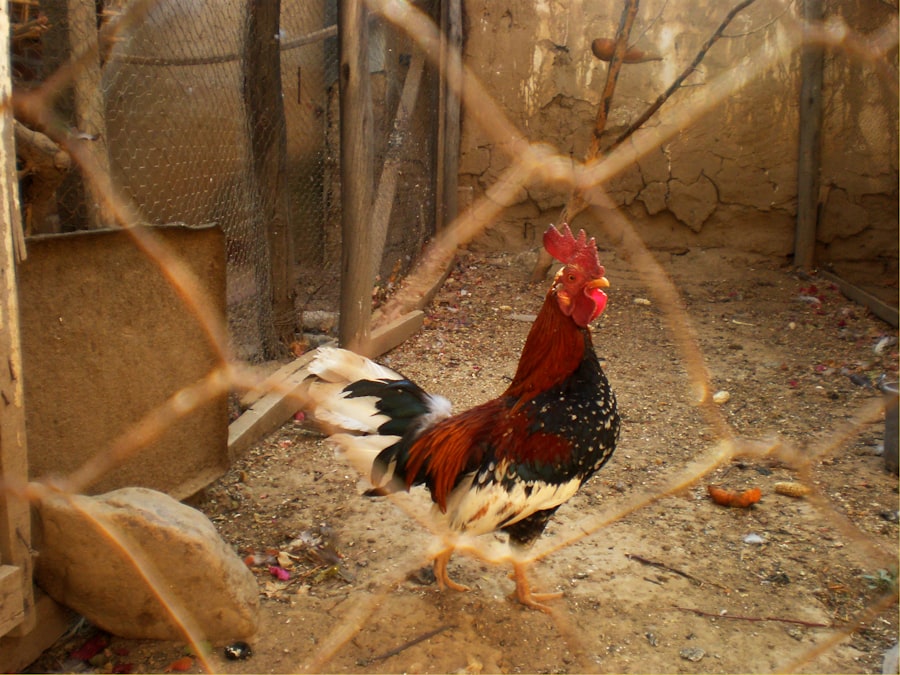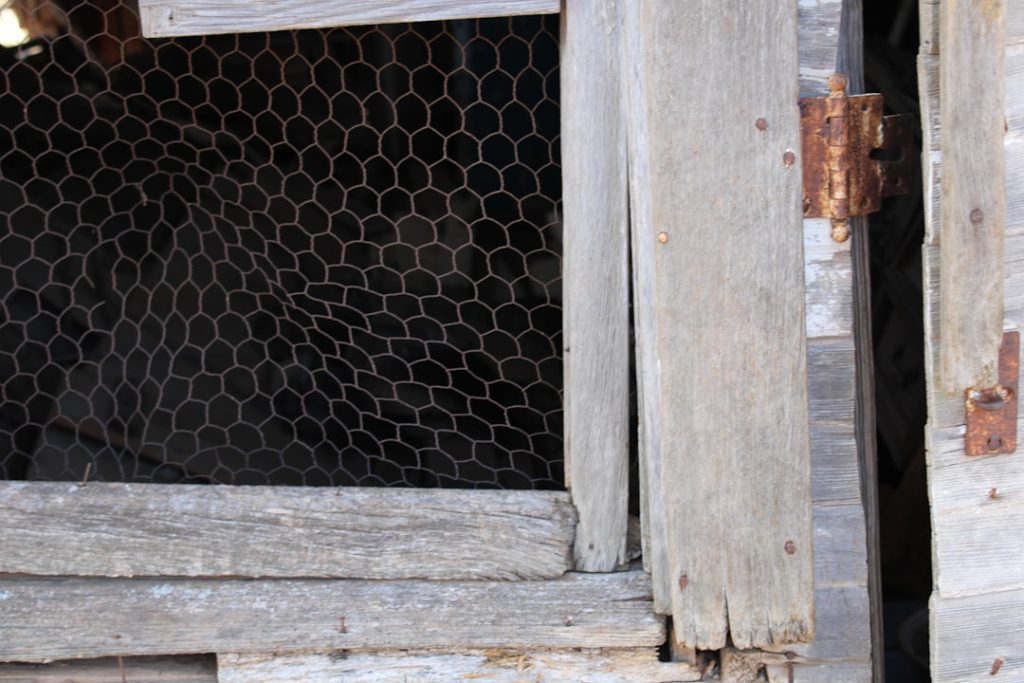Chickens are popular livestock animals commonly kept on farms and in residential backyards. They offer several benefits, including egg production, natural pest control, and entertainment value due to their unique behaviors. However, chicken owners often face challenges in restricting their birds’ access to certain areas.
Chickens may wander into vegetable gardens, flower beds, or neighboring properties, causing potential damage and frustration for owners and neighbors alike. This article examines various strategies for effectively managing chicken movement and preventing access to undesired locations. These methods include:
1.
Implementing physical barriers
2. Utilizing natural deterrents
3. Employing training and supervision techniques
4.
Creating alternative areas for chicken exploration
By understanding chicken behavior and applying these approaches, owners can maintain a positive relationship with their birds while protecting their property and surrounding areas. This balanced approach allows for the enjoyment of chicken-keeping while minimizing potential conflicts and damage.
Table of Contents
- 1 Understanding the Behavior of Chickens
- 2 Creating Physical Barriers
- 3 Using Natural Deterrents
- 4 Training and Supervision
- 5 Providing Alternative Areas for Chickens
- 6 Conclusion and Final Tips
- 7 FAQs
- 7.1 What are some effective ways to keep chickens out of flowers?
- 7.2 Why is it important to keep chickens out of flowers?
- 7.3 Are there any plants that can help repel chickens from flower beds?
- 7.4 What are some common mistakes to avoid when trying to keep chickens out of flowers?
- 7.5 How can I train my chickens to stay out of the flower beds?
Key Takeaways
- Chickens are naturally curious and can cause damage to gardens and other areas if not properly managed.
- Understanding the behavior of chickens, such as their natural foraging instincts, can help in finding effective solutions to keep them away from certain areas.
- Creating physical barriers, such as fences or netting, can be an effective way to keep chickens out of specific areas.
- Using natural deterrents, such as predator urine or strong-smelling plants, can help discourage chickens from entering unwanted areas.
- Training and supervision of chickens, as well as providing alternative areas for them to forage, can help manage their behavior and prevent damage to gardens and other areas.
Understanding the Behavior of Chickens
Following the Flock
Additionally, chickens are social animals and tend to follow each other’s lead. If one chicken discovers a new area to explore, the others are likely to follow suit. Understanding these behaviors is crucial in finding effective solutions for keeping chickens out of unwanted areas.
Habits and Routines
By recognizing their natural instincts and tendencies, chicken owners can implement strategies that work with, rather than against, their chickens’ behavior. Chickens are also creatures of habit and routine. Once they discover a new area to explore or a tasty treat to peck at, they are likely to return to that spot repeatedly.
Consistency is Key
This can make it challenging to deter them from unwanted areas. Additionally, chickens have a strong sense of curiosity and will often investigate any changes or new objects in their environment. This means that any attempts to keep them out of certain areas must be consistent and well-maintained to be effective. By understanding these behaviors, chicken owners can develop targeted strategies for keeping their chickens out of unwanted areas.
Creating Physical Barriers

One effective method for keeping chickens out of unwanted areas is to create physical barriers. This can be done using fencing, netting, or other materials that prevent chickens from accessing specific areas. For example, if chickens are getting into the vegetable garden, a simple fence with small gaps can be installed to keep them out.
It’s important to ensure that the barrier is secure and properly installed to prevent chickens from finding ways to bypass it. Additionally, regular maintenance and inspection of the barrier is necessary to address any wear and tear or potential weak spots. Another option for creating physical barriers is to use chicken wire or hardware cloth to cover specific areas.
This can be particularly useful for protecting flower beds or newly planted areas from chicken interference. By covering the soil with wire mesh, chickens are unable to scratch and peck at the ground, preventing damage to plants and soil. It’s important to secure the wire mesh properly to prevent chickens from lifting or moving it.
Overall, creating physical barriers is an effective way to keep chickens out of unwanted areas and protect property from potential damage.
Using Natural Deterrents
In addition to physical barriers, natural deterrents can also be effective in keeping chickens out of unwanted areas. Chickens have sensitive senses of smell and taste, which can be used to deter them from specific locations. For example, scattering citrus peels or spraying citrus-based solutions in the desired area can deter chickens due to their aversion to the smell of citrus.
Similarly, sprinkling cayenne pepper or hot sauce around the perimeter of the area can discourage chickens from entering, as they do not like the taste of spicy substances. Another natural deterrent that can be used is predator scent. Chickens are naturally wary of predators, so the scent of predators such as foxes or coyotes can deter them from entering specific areas.
Predator scent can be purchased in liquid form and applied around the perimeter of the desired area. It’s important to reapply the scent regularly to maintain its effectiveness. By using natural deterrents, chicken owners can discourage their chickens from entering unwanted areas without causing them harm.
Training and Supervision
Training and supervision are essential components of keeping chickens out of unwanted areas. Chickens can be trained to respond to certain cues and commands, making it possible to guide them away from specific locations. For example, using positive reinforcement such as treats or praise when chickens stay away from unwanted areas can help reinforce the desired behavior.
Additionally, using verbal commands or hand signals can help redirect chickens when they are heading towards a prohibited area. Supervision is also crucial in preventing chickens from accessing unwanted areas. By keeping an eye on the chickens while they are free-ranging or exploring the yard, owners can intervene when necessary to redirect them away from specific locations.
This may involve gently herding them away from the area or using distractions such as treats or toys to redirect their attention elsewhere. Consistent supervision and intervention can help reinforce boundaries and prevent chickens from accessing unwanted areas.
Providing Alternative Areas for Chickens

Designated Exploration Areas
Providing alternative areas for chickens to explore and forage can help redirect their attention away from unwanted locations. By creating designated areas for chickens to scratch, peck, and dust bathe, owners can encourage them to spend their time in specific locations rather than venturing into prohibited areas. This can be done by designating a specific area of the yard for free-ranging or by creating a designated chicken run with plenty of space for exploration.
Enrichment Activities
Additionally, providing enrichment activities such as hanging treats or toys can help keep chickens engaged and entertained in their designated areas. This can help reduce their interest in exploring other parts of the property where they are not welcome.
Minimizing Unwanted Access
By providing alternative areas for chickens to explore and engage in natural behaviors, owners can help minimize their desire to access unwanted locations.
Conclusion and Final Tips
In conclusion, keeping chickens out of unwanted areas requires an understanding of their behavior and implementing targeted strategies that work with their natural instincts. Physical barriers such as fencing and wire mesh can be effective in preventing access to specific locations, while natural deterrents such as citrus peels and predator scent can discourage chickens from entering unwanted areas. Training and supervision are essential in guiding chickens away from prohibited locations, while providing alternative areas for exploration and enrichment activities can help redirect their attention elsewhere.
In addition to these strategies, it’s important for chicken owners to remain consistent and patient when implementing these methods. Chickens may require time to adjust to new boundaries and expectations, so it’s important to be persistent in reinforcing these boundaries. Regular maintenance and inspection of physical barriers and deterrents is also necessary to ensure their continued effectiveness.
By understanding the behavior of chickens and implementing these strategies, chicken owners can maintain a harmonious relationship with their feathered friends while protecting their property from potential damage. With patience, consistency, and targeted interventions, it is possible to keep chickens out of unwanted areas and create a peaceful coexistence between chickens and their human caretakers.
If you’re looking for ways to keep chickens out of your flowers, you may also be interested in learning how to convert a shed into a chicken coop. Check out this article for tips on creating a suitable living space for your feathered friends.
FAQs
What are some effective ways to keep chickens out of flowers?
Some effective ways to keep chickens out of flowers include using physical barriers such as fences or chicken wire, using natural deterrents like citrus peels or coffee grounds, and providing alternative areas for the chickens to forage.
Why is it important to keep chickens out of flowers?
It is important to keep chickens out of flowers to protect the plants from being trampled, scratched, or eaten by the chickens. Additionally, some flowers may be toxic to chickens if ingested.
Are there any plants that can help repel chickens from flower beds?
Yes, there are some plants that can help repel chickens from flower beds, such as marigolds, lavender, and rosemary. These plants have strong scents that chickens may find unpleasant.
What are some common mistakes to avoid when trying to keep chickens out of flowers?
Some common mistakes to avoid when trying to keep chickens out of flowers include using harmful chemicals or pesticides, using flimsy barriers that chickens can easily bypass, and not providing enough alternative foraging areas for the chickens.
How can I train my chickens to stay out of the flower beds?
You can train your chickens to stay out of the flower beds by using positive reinforcement, such as providing treats in designated foraging areas, and using consistent verbal commands or signals to discourage them from entering the flower beds.
Meet Walter, the feathered-friend fanatic of Florida! Nestled in the sunshine state, Walter struts through life with his feathered companions, clucking his way to happiness. With a coop that’s fancier than a five-star hotel, he’s the Don Juan of the chicken world. When he’s not teaching his hens to do the cha-cha, you’ll find him in a heated debate with his prized rooster, Sir Clucks-a-Lot. Walter’s poultry passion is no yolk; he’s the sunny-side-up guy you never knew you needed in your flock of friends!







